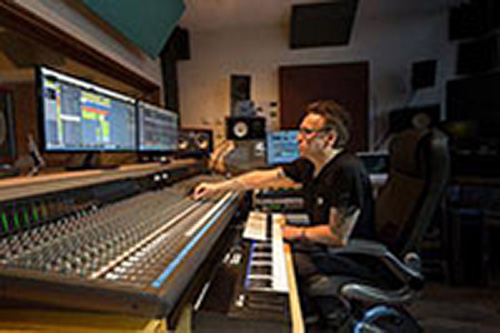There are many important elements to making a great record. The right songs, the right performances, good mixes and mastering, but the essence is great sound.
A recording engineer is the most important and hard working part of this process. Producers are important to helping artists realise a band or artist’s vision, and are often excellent recording engineers in their own right, but it is the studio engineer who facilitates the music making process.
Good all round knowledge
The studio engineer will know what the equipment is capable of, and also which microphone will work best for vocals or instruments, and the best place to position them. A session can take days to prepare, getting the perfect sound on a drum kit, and making decisions as to how best to track, whether live or to a click track and overdubbing each instrument. The engineer is also responsible for the upkeep of the equipment; if a microphone stops working properly, or a channel is buzzing, they are the ones who fix it. This job requires patience and no small amount of skill. It also allows for a lot of creativity and can be a fulfilling and lucrative career choice.
Multi-tasking
Engineers can fulfil any number of roles. As producer, they work with an artist to help get the full potential of the material realised and add their own specific and often signature sound. A great example is Ethan John’s work on Laura Marling’s latest record ‘Once I Was an Eagle.’ Johns, a producer and performer is also an excellent engineer is his own right and this record was realised with him behind the desk (and on drums, keys and guitar duties) helping Marling to realise one her most accomplished records.
As purely an engineer, working with a producer, or a band with a clear vision, the role requires setting up the studio space, placing microphones and getting suitable sound, and potentially having to work long hours getting the right take. In 99% of instances, the engineer is the second pair of ears, an authority on how to get the required sound, such as a big drum sound, or how to approach vocals in a different way, perhaps by having a number of different microphones set up, and a valuable asset to help fix problems or offer advice when the producer or artist hits a problem. Basically they need to know the recording studio inside and out.
Training but also innate skill
Many recording engineers train at college to not only understand the technological aspects of recording, but also the nature of acoustics and frequencies to enable them to be able to position both players and equipment in the right place. Recording engineers are always learning however, with constant updates in computer software and new equipment. The better engineers keep up to date with these changes, but also have their own optimum set-up that they know inside-out and can be sure they will get consistent results. Engineers such as John Wood and Joe Foster have become renowned for their signature sound and ability to capture perfectly the sound of artists.
The engineer can make or break a sound - performers; be patient!
When in the studio with an engineer there are a few things to consider, Firstly, the engineer will know their equipment, so if the set-up is taking time, there is a reason for that. An engineer will value or welcome opinions once the microphones are up and running if you are after a specific sound, so make sure you communicate. The engineer is working hard to get the right sound and is constantly listening, so when he suggests a break, that is probably a good time to take one, for their ears’ sake if nothing else. Similarly, when an engineer says a session is coming to an end for the day, then it is best to stop; you can play the performance of your life, but if the engineer is tired then mistakes can happen.
Setting achievable goals
Performer must make sure that the engineer knows what kind of sound they require by recommending listening material, and also make sure he knows how many tracks it is intended to record and whether the tracks will be live or click. An engineer must make sure that what is asked of them is possible so don’t commit to recording an orchestra if you only have one live room and three microphones available. See what part of the chain you are in as well. Does the artist expect you to mix the recordings as well as record them, or will they be sending it elsewhere? If this is the case you will need to label tracks carefully, which you should do anyway as it makes editing and mixing far easier. If possible listen to the act you are recording to get an idea of performances and sound, and spark ideas as to how best to record them.

